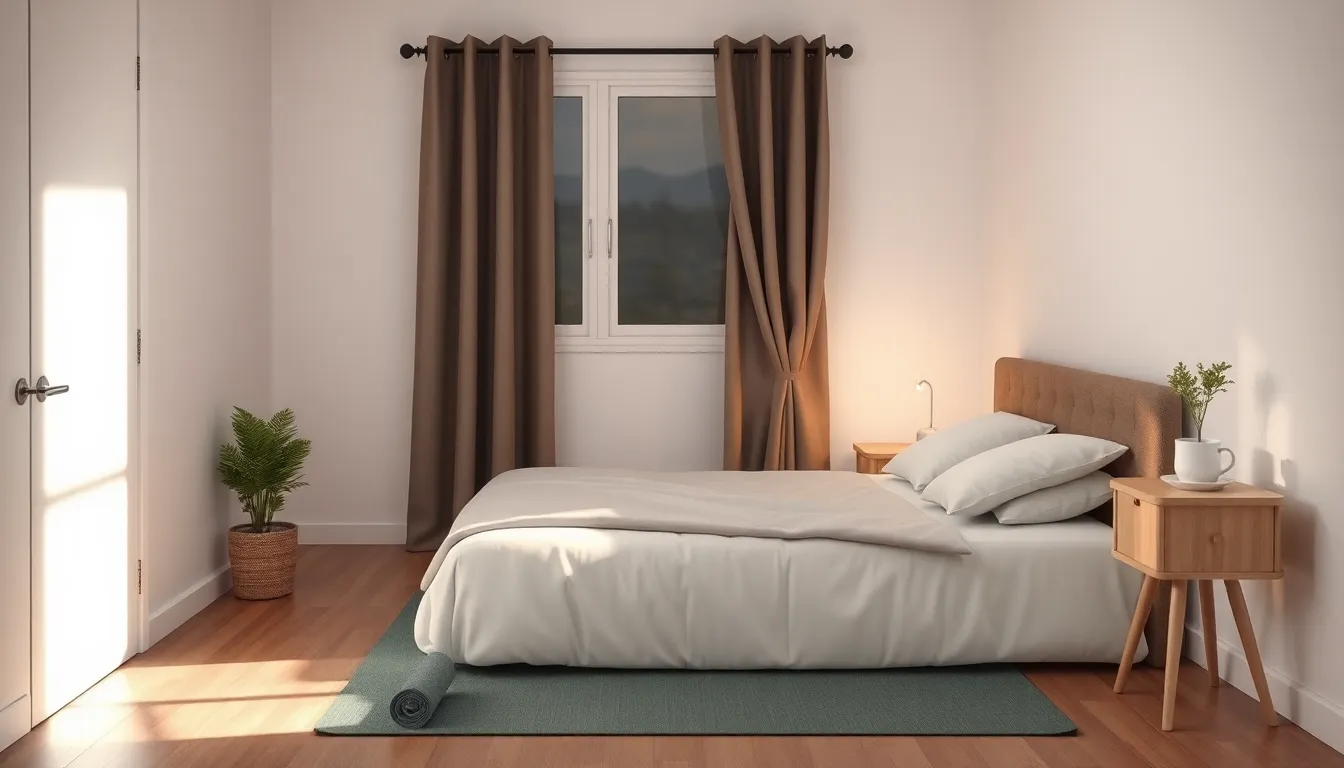In a world where sleep often takes a backseat to Netflix binges and late-night snacks, the quest for restful nights at home has never been more crucial. Imagine sinking into your bed like it’s a fluffy cloud, while your worries float away like a balloon at a birthday party. Sounds dreamy, right? Well, it’s time to turn that dream into reality.
At-home sleep isn’t just about catching Z’s; it’s an art form. With the right tips and tricks, anyone can transform their bedroom into a sleep sanctuary. So, whether you’re a self-proclaimed night owl or just someone who can’t resist scrolling through their phone at 2 AM, this guide will help you conquer the night. Get ready to reclaim your sleep and wake up feeling like a champion—because who doesn’t want to feel like a superhero in the morning?
Table of Contents
ToggleUnderstanding At Home Sleep
Transforming a space into a restful environment fosters quality sleep. At-home sleep techniques create opportunities for rejuvenation and overall wellness.
Importance of Sleep
Sleep plays a crucial role in physical and mental health. Studies show that consistent sleep enhances cognitive function and regulates emotions. Chronic sleep deprivation can lead to serious health issues like obesity, diabetes, and cardiovascular diseases. Prioritizing quality rest helps maintain a balanced lifestyle and strengthens immune defenses. Individuals who sleep well often report higher energy levels, improved mood, and better performance in daily tasks. Sleep serves as a foundation for optimal physical functioning and emotional resilience.
Benefits of Quality Sleep
Quality sleep delivers numerous benefits for overall well-being. Gains in memory consolidation occur during deep sleep, promoting learning and retention. Emotional regulation improves as the brain processes experiences and memories. Sleep also plays a pivotal role in physical recovery following exercise and daily activities. Hormones that support growth and metabolism release during rest. Increased productivity and creativity stem from well-rested minds, enhancing problem-solving abilities. Regularly achieving quality sleep boosts motivation and satisfaction, contributing to a healthier lifestyle.
Creating an Ideal Sleep Environment

Creating a conducive sleep environment is essential for restful sleep. Focus on optimizing bedroom conditions to enhance relaxation and comfort.
Bedroom Setup
A well-organized bedroom promotes tranquility. Choose a comfortable mattress and supportive pillows tailored to individual preferences. Use calming colors, like soft blues or greens, to foster a serene atmosphere. Ensure the room remains uncluttered, as excess items can distract and induce stress. Position the bed to avoid facing distractions such as electronics and maintain a temperature between 60°F and 67°F for optimal sleep.
Light and Noise Control
Managing light and noise is crucial for uninterrupted sleep. Block external light by using blackout curtains and shades. Dimming lights an hour before bed signals the body to wind down. Invest in a white noise machine or use earplugs to drown out disruptive sounds. Creating a consistent bedtime routine enhances the body’s natural sleep-wake cycle, further promoting quality rest.
Establishing a Bedtime Routine
Creating a consistent bedtime routine enhances quality sleep. This routine allows the body to recognize when it’s time to wind down and prepare for rest.
Benefits of a Consistent Schedule
Consistency in sleep schedules improves overall health. Regular sleep patterns help regulate the body’s internal clock, leading to better sleep quality. Improved cognitive function emerges from this predictability, allowing for sharper focus and better memory retention. Emotional stability also increases, reducing feelings of anxiety and irritability. Additionally, a consistent schedule enhances physical recovery by promoting the release of sleep hormones. This simple practice ultimately supports long-term health, preventing serious issues like obesity and cardiovascular diseases.
Relaxation Techniques
Incorporating relaxation techniques into a bedtime routine promotes restful sleep. Deep breathing exercises help lower stress levels, encouraging a calm state before sleep. Progressive muscle relaxation eases tension in the body, preparing it for a restful night. Meditation can further enhance tranquility, focusing the mind and easing racing thoughts. Gentle stretching also aids in releasing physical stress, contributing to overall relaxation. Engaging in these techniques creates a soothing environment that invites restorative sleep.
Common Sleep Issues and Solutions
Sleep issues can significantly affect overall well-being, yet several strategies exist to address them effectively.
Insomnia at Home
Insomnia refers to difficulty falling or staying asleep. Individuals experiencing insomnia often face daytime fatigue and reduced focus. Establishing a calming bedtime routine can combat this issue. Incorporating relaxation techniques such as deep breathing and gentle stretching may enhance sleep onset. Limiting screen time an hour before bed helps reduce stimulation from devices. Creating an environment conducive to sleep, with comfortable bedding and low light levels, plays a vital role. Studies indicate that 30% of adults experience insomnia, underscoring its prevalence and the need for effective solutions.
Sleep Disorders
Sleep disorders encompass a variety of conditions impacting sleep quality. Conditions like sleep apnea, restless leg syndrome, and narcolepsy require attention and tailored interventions. Individuals with sleep apnea might experience interrupted breathing, leading to excessive daytime sleepiness. Continuous positive airway pressure (CPAP) therapy serves as a common treatment to ensure uninterrupted airflow during sleep. Restless leg syndrome often compels individuals to move their legs, disrupting sleep patterns. Employing consistent sleep hygiene practices can mitigate the effects of these disorders. According to the National Sleep Foundation, approximately 50 to 70 million adults in the U.S. suffer from sleep disorders, highlighting the urgency of addressing these concerns.
Optimizing Sleep Quality
Enhancing sleep quality involves adopting specific lifestyle changes that promote overall well-being. Two crucial areas of focus include nutrition and exercise.
Nutrition and Sleep
Nutrition significantly affects sleep quality. Consuming a balanced diet rich in whole foods, fruits, and vegetables promotes better rest. Foods that contain magnesium, like leafy greens and nuts, contribute to relaxation. Avoiding heavy meals and caffeine close to bedtime prevents sleep disturbances. Sipping herbal teas, such as chamomile or valerian root, can also foster a calming effect before sleep. Additionally, maintaining proper hydration enhances bodily functions without leading to nighttime awakenings.
Exercise and Sleep Patterns
Engaging in regular physical activity positively influences sleep patterns. Moderate exercise, performed at least 30 minutes a day, improves overall sleep quality. Activities like walking, cycling, and yoga have shown effectiveness in promoting restful sleep. Timing workouts is essential; morning or early afternoon sessions maximize benefits without hindering the ability to fall asleep. Simple stretching routines before bedtime can also relax the body and signal the brain that it’s time to wind down. Prioritizing exercise contributes to long-lasting health benefits and improves the quality of rest.
Prioritizing restful sleep is essential for overall well-being and a balanced lifestyle. By transforming the bedroom into a sleep sanctuary and adopting consistent bedtime routines, individuals can significantly improve their sleep quality. Incorporating relaxation techniques and making mindful lifestyle choices further enhances the ability to achieve restorative rest.
Addressing common sleep issues and optimizing sleep hygiene is crucial for anyone struggling with insomnia or other sleep disorders. With dedication to these practices, anyone can reclaim their nights and wake up feeling refreshed and empowered. Ultimately, embracing the art of at-home sleep can lead to a healthier and more productive life.




